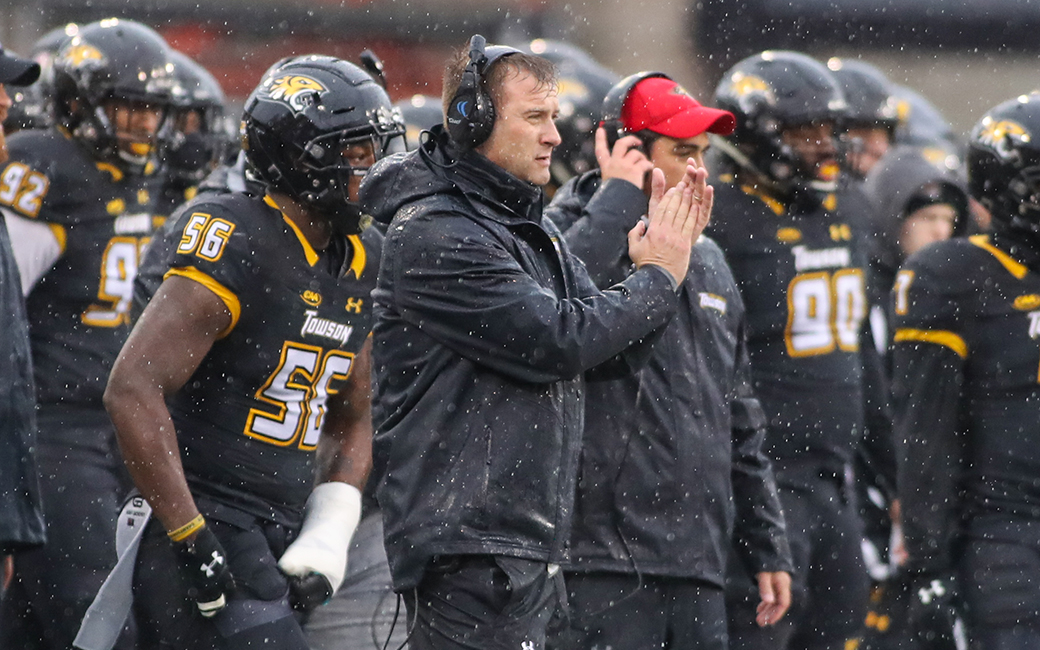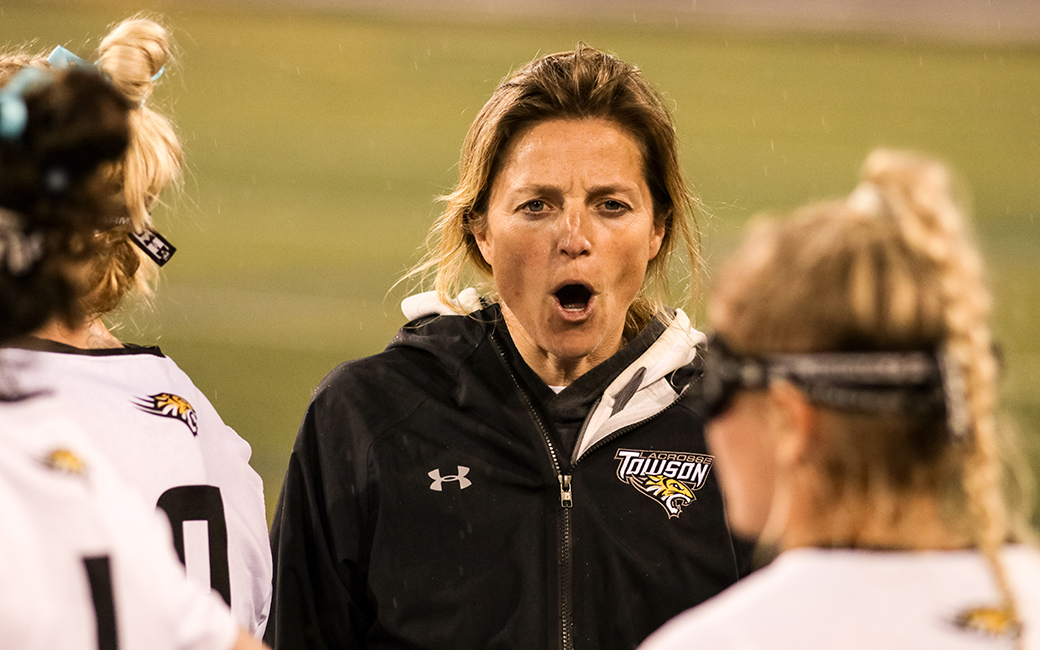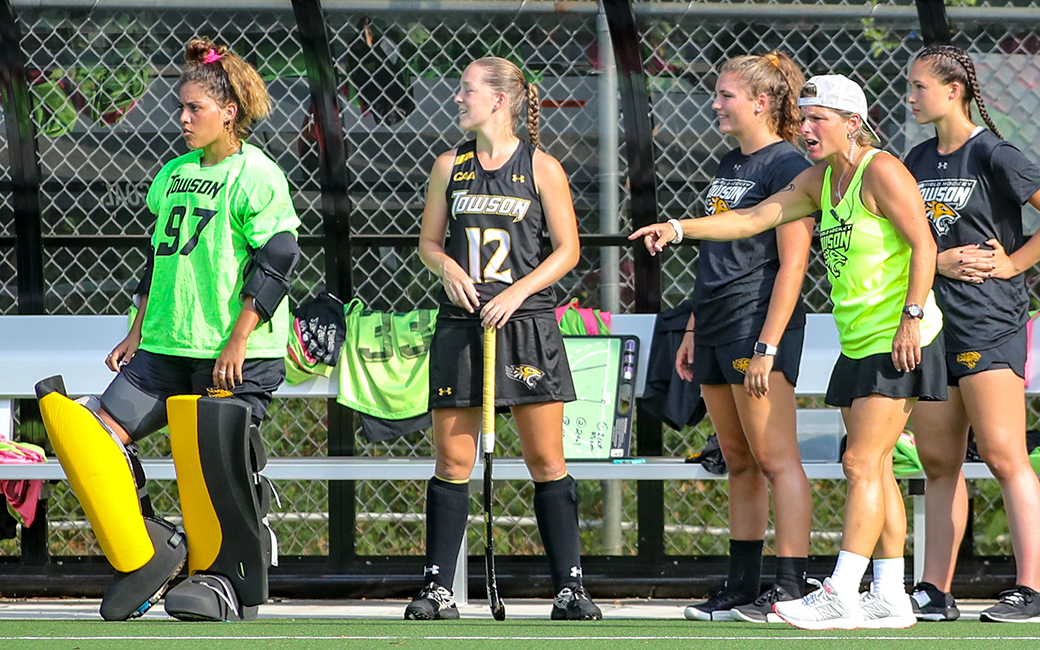TU athletics learning to roar virtually
With communication key for many sports, several Tiger teams are learning to bond in different ways
By Kyle Hobstetter on April 14, 2020

Amid the COVID-19 pandemic, Towson University has moved all classes online. Although the TU community is maintaining physical distance, we are still focusing on social solidarity. This article is the second in a series that looks at how different campus communities are staying together while staying apart.
Towson University Athletics was in its busiest time of the year. Eight sports were in the middle or end of their seasons, while others were taking part in spring practices.
The Tiger women’s basketball team was preparing for the Colonial Athletic Association Basketball Tournament. Both men’s and women’s lacrosse were at the start of conference play, while the football team had just its second practice of the spring.
Then sports around the country just…stopped.
To help prevent the spread of COVID-19, many sports leagues and organizations canceled practices, games and even championships. Now many athletes and coaches are staying home and interacting with each other online.
Over the past month, several TU coaches have been finding different ways to stay in contact with their teams. Whether its video meetings, chat groups or fun social media projects, here are ways that Tiger Athletics is sticking together.

Calling an audible
For TU football coach Rob Ambrose, who has been coaching for 27 years, this is uncharted territory.
“I think I’ve used the word ‘unprecedented’ more in the past two weeks than the last five years combined,” Ambrose says. “We went from talking about football to just trying to stay connected with our team and figuring out how we can help them the best we can.
“Sports teams are like a family. Not being able to have that physical closeness and that time away is what we’re trying to combat.”
In college football, spring practices are critical. The sessions allow players to gel as a team and set goals for the upcoming season. But this spring, a month of practices was shrunk to just two for Ambrose and the Towson Tigers football team.
With his players sent home for the rest of the academic term, Ambrose is no longer focusing on practices and time in the gym. He’s now making sure his players are focusing on working out at home and staying up on their academics.
“If you were afraid of technology before, you’re in trouble now,” Ambrose laughs. “We can’t let ourselves not communicate. Communication is key to our success and challenges like this exist, so we’re going to have to adapt.”
Ambrose and his staff have moved all team meetings online using Cisco’s WebEx Teams video conferencing system. More than 100 players, coaches and staff members attend the same meetings.
Here is where Ambrose and the staff check on academics, diets and workouts. They discuss representing the team and potential community service opportunities they can perform.
Ambrose is also focusing on “Tiger Accountability,” which is a leadership program where players work together, across position groups, to hold each other accountable. This means a defensive lineman making a video call to a wide receiver to collaborate on homework.
Players are divided into groups, and as they hold each other accountable, their groups will earn points. The team with the most points at the end of the spring season earns a home-cooked meal from Ambrose, or as he calls it “the best home-cooked meal you can get without leaving school.”
But don’t be surprised that after being away from his team that the head coach will invite everyone.
“Truth be told I’m sad because I miss the staff, the kids, the cleaning team…I miss our family,” Ambrose says. “But we’re all going to come out of this in the end, and I need to show them that. Instead of separating, we’re going to get tighter.”

Bigger than lacrosse
On March 11, Sonia LaMonica was preparing for TU women's lacrosse's next game against UMass. She had just finished a film session and was about to head out to practice when she received a text telling her the game was canceled.
She had known things were up in the air because of COVID-19, but she never thought the entire season would be as well.
When the NCAA canceled all spring sports for the year, she had to find a way to break it to her team.
“Once I got that text, I had to take a few minutes to collect myself,” LaMonica says. “This time, it has been so difficult because it’s just something so unprecedented. But my biggest message is this is bigger than us and bigger than lacrosse.”
It was difficult for LaMonica at first. After starting the year with three straight losses, her team seemed to be turning a corner. The Tigers had won two of the previous three heading into conference play.
Finishing the season with a win has been LaMonica’s silver lining to all this. She’s also hoping the strong finish will give her team a push into next season.
“If we had to have our season end, that was a great point to end it,” LaMonica says. “There’s an excitement for next year about where we can go and how we can build on the shifting momentum from this season.”
LaMonica says the team has been in constant contact with each other through the team’s GroupMe group text messaging thread. The players have also been having virtual team meetings, where they are in the same space for 30 minutes a week to evoke connection and support.
LaMonica will also be talking to players through individual meetings, hoping to give them feedback to use going forward. She has also broken the team into smaller groups that check in on each other.
She wants her team to know that while they are going through various challenges, they are not going through them alone.
“It’s human nature to have that sense of connection,” LaMonica says. “I’ve seen that this team is motivated in staying together and holding each other accountable. Motivation and accountability are… what they lean on and expect.”

Finding a new pitch
One thing that head coach E.A. Jackson is confident about with the Tigers’ field hockey team is its ability to stay in touch.
Before starting their last practice of the spring—like football - they still had several weeks of practice still scheduled. The field hockey team treated it as a last hoorah. It was there Jackson got to see the intense closeness of her team.
“That last practice, they wanted it to be their best two-hour session of the year,” Jackson says. “At the end of practice there were a lot of tears because it felt like an emotional release. They realized they were walking off the pitch for the last time until August.”
Jackson says this is a tremendous time for them to work on their communication.
Every Tuesday the team has a 40-minute meeting through Zoom filled with academics, workouts or catch up sessions.
They also have smaller “family groups,” featuring four to five team members led by an older member of the team. Jackson calls the leaders matriarchs. These smaller groups meet over Zoom twice a week — once on Mondays by themselves then again on Thursday or Friday with a coach.
The team is also finding fun ways to interact with the rest of the TU community. Field hockey has worked with the Towson Athletics Communications staff to do daily Instagram takeovers with stories featuring tricks, home workouts and healthy eating hacks.
Like Ambrose and LaMonica, Jackson sees her players as committed to one another on the field at TU and now in their homes during this extraordinary time.
“I’m so happy to see them bring their energy and personality to our social media platforms,” Jackson says. “They’re staying connected, and the fact they are building these connections and develop their communication skills—it’s going to show up on the pitch this fall.”